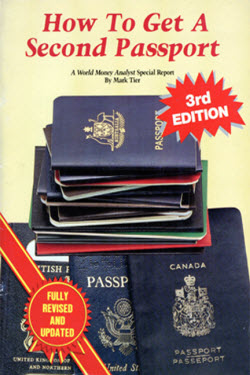Chapter 1
Why Do You Want A Second Passport

A second passport can give you peace of mind. It can help save you taxes. It can expand your travel opportunities. In some circumstances a second passport could even save your life. Here more specifically are some of the reasons why you might want a second passport.
Residence.
Residence gives you the right, without having to ask permission, to live andwork in the country of your choice.
Security.
“Just in case.” The world is an unstable place. Anything could happen — although it probably won’t. Against the day when it might, however, a second passport, or second nationality, means that when you decide you’re no longer happy in your normal place of residence, you do not need to apply for permission to reside somewhere else, because you already have the right to do so.
Travel.
A second passport can make it easier for you to travel to many countries, especially if you now hold a restricted passport such as a Hong Kong Certificate of Identity, or a Taiwanese, Israeli or South African passport. Depending on your choice of second passport, or second nationality, the process of gaining entry to many other countries can be made much more simple.
Safety.
Even if you hold one of the world’s most respected passports~ such as that of a US citizen, there can be times when you wish you were able to show some other piece of identification. For example: when the aircraft in which you are travelling is hi-jacked by anti-American terrorists.
Business and work.
Another passport will more often than not give you the right to work and do business in its country of issue without obtaining a work permit, and similar advantages above and beyond those of your current national status. Citizenship of a member state of the European Economic Community gives you the right, under the Treaty of Rome, to live, work and/or establish a business in any other member country of the EEC.
Taxes.
A change of residence or citizenship (depending on your current nationality) can, if properly handled, save a high taxpayer a significant amount of money.
There are many reasons why you might want a second passport. But the process of obtaining one from most countries usually requires 5 or 6 years’ residence in the country concerned. Unless you really want to go and live there right now, that price may be more than you want to pay. You may have to give up, in whole or in part, your present career and life pattern. Moreover there are often many hurdles to surmount in obtaining the initial right to reside without which the qualifying period of residence cannot even begin; so the number of people who do qualify is small compared with the numbers of people who would like to do so.
Another way to acquire a second nationality is to buy a passport. Libertarians may find this distasteful on the grounds that we should be free to live and work anywhere in the world without restriction. Often, too, a large chunk of the price goes to useless government officials (direct bribery), or is spent by the government on grandiose projects (indirect bribery).
In reality, you can buy a passport from any country — it is merely a question of price. The laws of the US, for example, which contained at the time no provision for investor immigration or business immigration, did not prevent Australian Rupert Murdoch from becoming a US citizen. If you have lots of money and good lawyers you can get in anywhere.
Countries where citizenship is not ostensibly for sale nevertheless compete quite blatantly for the patronage of wealthy individuals. They create provisions in their immigration laws for the admission of business migrants with wallets fat enough to provide governments with help in getting re-elected by claiming to have saved or created jobs by their wise policies. Examples? Canada, Australia and New Zealand.
Other place less emphasis on the immigration aspects of inward investment but, as a by-product, immigration possibilities are nevertheless there — they have to be, to enable the investor to keep a close eye on his investment, or he will not part with his money. Examples? The Philippines and the UK. Some countries look to import the spending power that persons in retirement can bring in response to offers of immigration rights — often on condition that they are not allowed to compete with the native workforce, which has the votes. The Philippines, again, is an example.
There are other countries that are less dishonest — or their officials are more straightforwardly corrupt — so that their passports are more readily available. In seeking a second citizenship, you should understand that there are many such products on the Taxes.
A change of residence or citizenship (depending on your current nationality) can, if properly handled, save a high taxpayer a significant amount of money.
There are many reasons why you might want a second passport. But the process of obtaining one from most countries usually requires 5 or 6 years’ residence in the country concerned. Unless you really want to go and live there right now, that price may be more than you want to pay. You may have to give up, in whole or in part, your present career and life pattern. Moreover there are often many hurdles to surmount in obtaining the initial right to reside without which the qualifying period of residence cannot even begin; so the number of people who do qualify is small compared with the numbers of people who would like to do so.
Another way to acquire a second nationality is to buy a passport. Libertarians may find this distasteful on the grounds that we should be free to live and work anywhere in the world without restriction. Often, too, a large chunk of the price goes to useless government officials (direct bribery), or is spent by the government on grandiose projects (indirect bribery).
In reality, you can buy a passport from any country — it is merely a question of price. The laws of the US, for example, which contained at the time no provision for investor immigration or business immigration, did not prevent Australian Rupert Murdoch from becoming a US citizen. If you have lots of money and good lawyers you can get in anywhere.
Countries where citizenship is not ostensibly for sale nevertheless compete quite blatantly for the patronage of wealthy individuals. They create provisions in their immigration laws for the admission of business migrants with wallets fat enough to provide governments with help in getting re-elected by claiming to have saved or created jobs by their wise policies. Examples? Canada, Australia and New Zealand.
Others place less emphasis on the immigration aspects of inward investment but, as a by-product, immigration possibilities are nevertheless there — they have to be, to enable the investor to keep a close eye on his investment, or he will not part with his money. Examples? The Philippines and the UK.
Some countries look to import the spending power that persons in retirement can bring in response to offers of immigration rights — often on condition that they are not allowed to compete with the native workforce, which has the votes. The Philippines, again, is an example.
There are other countries that are less dishonest — or their officials are more straightforwardly corrupt — so that their passports are more readily available. In seeking a second citizenship, you should understand that there are many such products on the market. Those that are most readily available may not have quite the same quality as those that are hard to get.
Groucho Marx, remember, was not sure he would really want to join any club that would have him as a member.
However, provided you ensure that under whatever deal you are offered you become a full, naturalised, citizen under the laws of the country concerned, you will be entitled to all rights attaching to that citizenship, wide or less wide as they may be.
There are two reasons, in summary, why most people might seek a second nationality:
(a) Emigration.
You may wish to leave the country of your birth or renounce your current citizenship in order to live and work in another place. You may wish simply to retire somewhere nice, where living costs, including taxation, are lower than where you live now.
In seeking the freedom to live and work (or not) in the new country without restriction, you can seek either a temporary work permit or permanent residency. Only the latter can lead to citizenship. In this case, the obtaining of a second nationality is secondary.
(b) Security/uncertainty.
Whatever the uncertainty you are attempting to reduce, in this case your primary aim is to gain a second nationality that allows you the greatest international flexibility — whether for work, business, family, travel or security reasons — with minimum interference to your current lifestyle. In this case, the requirement of most countries that you take up residence there — that you prove by a period of residence that you really want to live there, and “contribute,” rather than just obtain your freedom in a world of autarchic states — becomes that price which you may be unwilling to pay, whether in changing jobs, transferring your business, moving your children from their present schools, or giving up golf.
The purpose of this Report is to analyse the requirements of different countries for the grant of the right to reside and of citizenship rights, and to identify one particular country that in my opinion offers the best combination of freedom of movement, simplicity in qualifying for citizenship, but does not currently require your physical presence as a resident for any length of time.
I will also be suggesting other countries which may satisfy your needs, particularly if speed is paramount.
Before I go on to consider citizenship in the next chapter, I ought to mention a quick way to get a second passport without acquiring a second citizenship. If you are going to travel regularly both to Arab countries and to Israel, most countries, particularly if your purpose is business, are willing to issue you with a duplicate of your present passport, so that entry and exit stamps from one side need not show up when you visit the other — as long as you remember which is which passport. The same probably goes for people travelling both to Iran and Iraq, or other problem areas. If you foresee difficulty you should seek the advice of your consular service.

